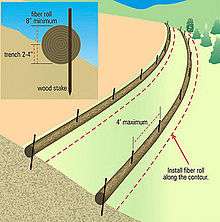Fiber roll

A fiber roll is a temporary erosion control and sediment control device used on construction sites to protect water quality in nearby streams, rivers, lakes and seas from sediment erosion. It is made of straw, coconut fiber or similar material formed into a tubular roll.
Installation
Each horizontal contour level row of fiber rolls is installed on slopes, ending with one at the base of the slope, below an active construction area before soil disturbance (earth moving) begins. The space between each row of fiber roll is dependent on the steepness of the slope. The steeper the slope, the more rows of evenly spaced horizontal contour level fiber rolls are used. Each fiber roll is installed on a horizontal contour level in shallow trenches 2 to 4 inches (5 to 10 cm) deep and fastened to the ground with wooden stakes.
Properly installed fiber rolls are effective at trapping sediment, generally more effectively than straw bales.[2][3] During rain storms, the rolls intercept surface stormwater runoff (but not concentrating or channeling the runoff) and reduce the velocity of flow. Water passes through a fiber roll while leaving behind the sediment on the uphill side of the roll, thereby reducing sediment erosion.
Limitations
Fiber Rolls have several limitations to their uses:[4]
- Fiber rolls may be difficult to move once they become saturated with water.
- Fiber rolls should not be used on very steep land that is prone to mudslides, landslides or creep.
- If fiber rolls are not properly staked into the ground, they may be carried away by high flows.
See also
References
- ↑ U.S. Environmental Protection Agency (EPA). Washington, DC. “Developing Your Stormwater Pollution Prevention Plan: A Guide for Construction Sites.” Document No. EPA-833-R-060-04. May 2007.
- ↑ California Stormwater Quality Association. Menlo Park, CA. "California Stormwater BMP Handbook: Fiber Rolls." Fact Sheet No. SE-5. January 2003.
- ↑ U.S. EPA. "National Menu of Stormwater Best Management Practices: Fiber Rolls." June 1, 2006.
- ↑ "Fiber Rolls". National Pollutant Discharge Elimination System (NPDES). Environmental Protection Agency (EPA). Retrieved 14 December 2013.
External links
- Erosion Control Technology Council - a trade organization dedicated to the education and standardization of the erosion control industry
- Erosion Control - a trade magazine for the erosion control and construction industries
- International Erosion Control Association - Professional Association, Publications, Training
- National Menu of Stormwater Best Management Practices - Information on good stormwater management practices